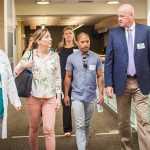President’s Column: ‘Coordinated Care’ at the Highest Level
by Karim E. Sirgi, MD, MBA, FCAP
The concept of the “care team” is becoming more common in medicine. Patients are beginning to understand that there are better outcomes when doctors work together on diagnosis and treatment. Looking back on the Foundation’s 13 See, Test & Treat programs this year, I saw a combination of logistics and leadership that show pathologists are practically redefining what “coordinated care” means.
Follow me on a journey as I explain.
Jackson, Mississippi—January
Jackson is home to half a million people. In this community, the poverty rate is 30 to 40 percent. At the University of Mississippi Medical Center today, 41 women, who would otherwise have no access to health care, are receiving life-saving cancer screening.
Organizing and planning for this event, Stephen S. Raab, MD, FCAP, the lead pathologist for the Jackson See, Test & Treat program, knew that a huge task was ahead of him; and he also knew the need was great. In gaining buy-in from his institution, obtaining all the necessary approvals, and lining up an army of doctors, nurses, and other volunteers, he approached no less than 32 stakeholders from clinical, administrative, patient advocacy, and state public health representatives.
Norton, Virginia—August
On to the small town of Norton, the westernmost city in Virginia, and also the state’s least populous, where 23% are living below the poverty line.
Theresa S. Emory, MD, FCAP, is the organizer of this event. In addition to engineering the support of local businesses and officials, Dr. Emory also has convinced the pathology groups and CEOs of two local competing health care systems to join together for the first time—just to make free cancer screening available under the banner of See, Test & Treat. Forty-four women are here today for screenings and cancer education.
Maywood, Illinois—August
Now we’re in a Chicago suburb, Maywood, home to the Loyola University Medical Center. Eva M. Wojcik, MD, FCAP, veteran of two See, Test & Treat programs at Loyola, is presiding over her third program. “I am excited and empowered to organize such a lifesaving event in my community,” she tells me.
In her first See, Test & Treat year, she spent months cajoling and convincing critical stakeholders of the C-suite, medical staff colleagues, the hospital media team, and representatives from the community. Sixty-five women are patients here today. Dr. Wojcik overhears a nurse praising See, Test & Treat: “It was all organized by a PATHOLOGIST!”
In this case, “organized” is just another word for “leadership.”
See, Test & Treat programs require leaders who are inspired, energized, and compelled. They are pathologists, pathology residents, and medical students who engage patients and their family members with enthusiasm and passion.
Each year, hundreds of women—with limited access to the health care system—get free breast and cervical cancer screening, with same-day results, at See, Test & Treat programs. This could not happen without the leadership of a pathologist who decided to step out from behind the scenes to the center stage of organizing a life-transforming event for the community.
And that’s how we define “coordinated care” at the CAP Foundation.


